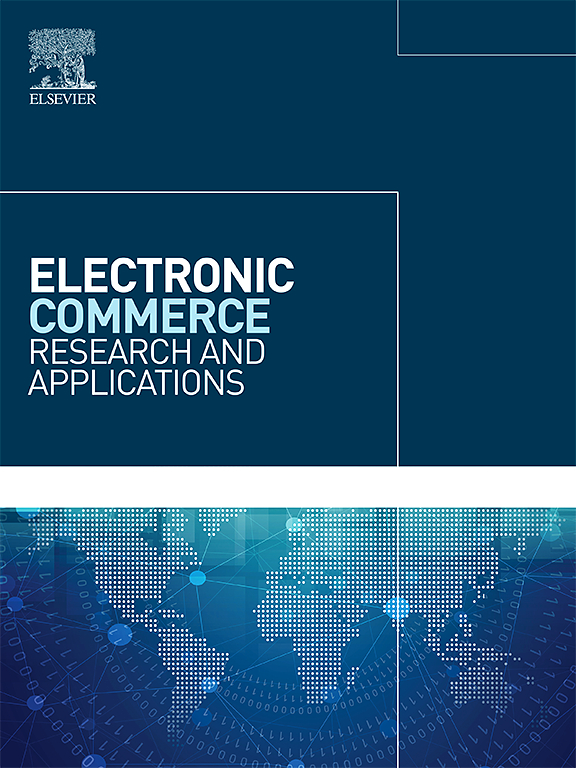你值得我给小费:为什么人们会自愿为社交媒体平台上的用户生成内容付费?
IF 6.3
3区 管理学
Q1 BUSINESS
Electronic Commerce Research and Applications
Pub Date : 2025-03-30
DOI:10.1016/j.elerap.2025.101501
引用次数: 0
摘要
社交媒体平台已开始广泛采用 "按需付费"(PWYW)的定价模式来销售用户生成内容(UGC)。然而,对于社交媒体用户为什么会自愿为 UGC 付费(即使在 PWYW 条件下他们可以轻松免费搭车),我们的研究还不够深入。在本文中,我们从理论上推导并研究了一个模型,以理解用户在社交媒体上为 UGC 付费的行为。借鉴社会交换理论,我们将感知价值作为核心前因,并分析了与用户 "PWYW "行为相关的收益和成本。此外,我们还提出用户的惠益行为体验和社会认可是重要的情境因素,并研究了它们在影响用户惠益行为决策中的作用。为了检验研究模型,我们进行了一项在线调查研究,结果显示了两大发现。首先,社交媒体用户主要看重 "想买就买 "行为带来的产品互惠和愉悦,但同时也关注电子支付过程中的感知机会成本和不便,在此基础上形成的感知价值进一步决定了他们的 "想买就买 "频率。其次,社交媒体用户的惠益行为体验和社会认可也会影响他们的惠益行为频率,而这两种效应分别部分和完全受到感知价值的中介作用。我们的研究揭示了促使社交媒体用户参与 UGC 消费的关键因素,为今后的理论研究和实践工作奠定了基础。本文章由计算机程序翻译,如有差异,请以英文原文为准。
You are worth my tipping: Why do people voluntarily pay for User-Generated-Content on social media platforms?
Social media platforms have begun to widely adopt the Pay-What-You-Want (PWYW) pricing model to sell User-Generated-Content (UGC). However, it is still under-explored why social media users voluntarily pay for UGC even if they can easily free-ride under PWYW conditions. In this paper, we theoretically derive and examine a model to understand users’ PWYW behaviors for UGC on social media. Drawing on social exchange theory, we treat perceived worth as the core antecedent and analyze the benefits and costs associated with users’ PWYW behaviors. In addition, we also propose that users’ PWYW experience and social endorsement are important contextual factors and examine their roles in shaping users’ PWYW decisions. To test the research model, we conducted an online survey study, and the results revealed two major findings. First, social media users mainly value the reciprocity for product and pleasure brought by PWYW behaviors but are also concerned about the perceived opportunity cost and inconvenience of e-payment process, based on which they form perceived worth that further determines their PWYW frequency. Second, social media users’ PWYW experience and social endorsement also influence their PWYW frequency, and the effects are partially and fully mediated by perceived worth, respectively. Our research reveals the crucial factors that motivate social media users’ PWYW engagement in UGC consumption and lays the foundation for future theoretical research and practical work.
求助全文
通过发布文献求助,成功后即可免费获取论文全文。
去求助
来源期刊

Electronic Commerce Research and Applications
工程技术-计算机:跨学科应用
CiteScore
10.10
自引率
8.30%
发文量
97
审稿时长
63 days
期刊介绍:
Electronic Commerce Research and Applications aims to create and disseminate enduring knowledge for the fast-changing e-commerce environment. A major dilemma in e-commerce research is how to achieve a balance between the currency and the life span of knowledge.
Electronic Commerce Research and Applications will contribute to the establishment of a research community to create the knowledge, technology, theory, and applications for the development of electronic commerce. This is targeted at the intersection of technological potential and business aims.
 求助内容:
求助内容: 应助结果提醒方式:
应助结果提醒方式:


